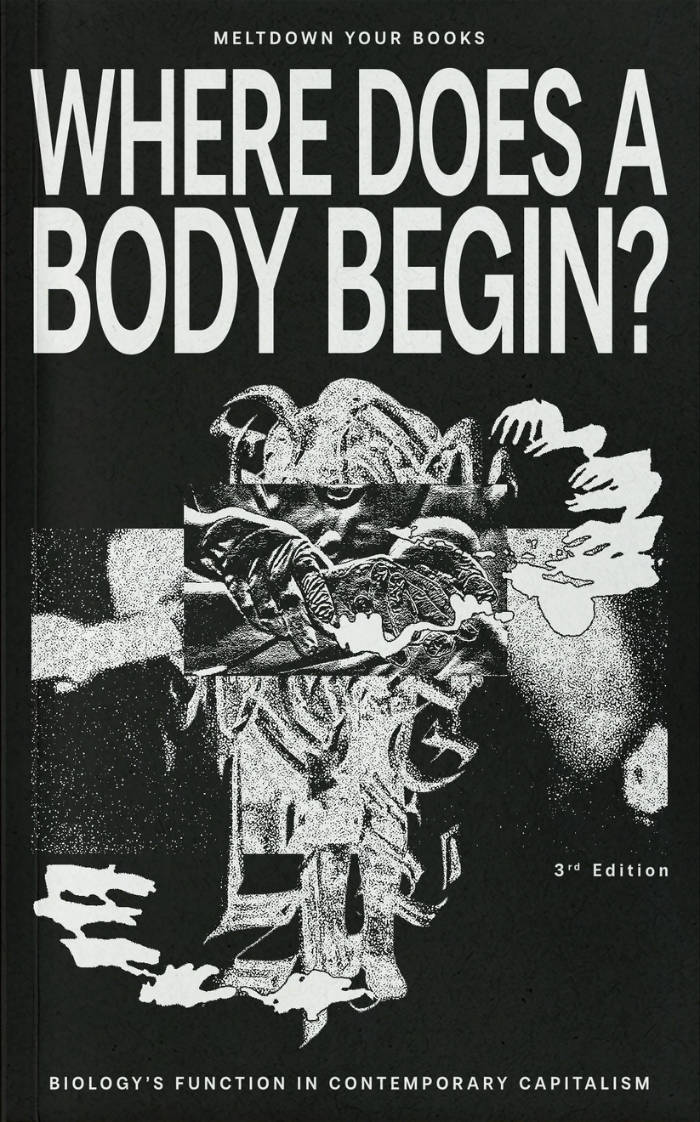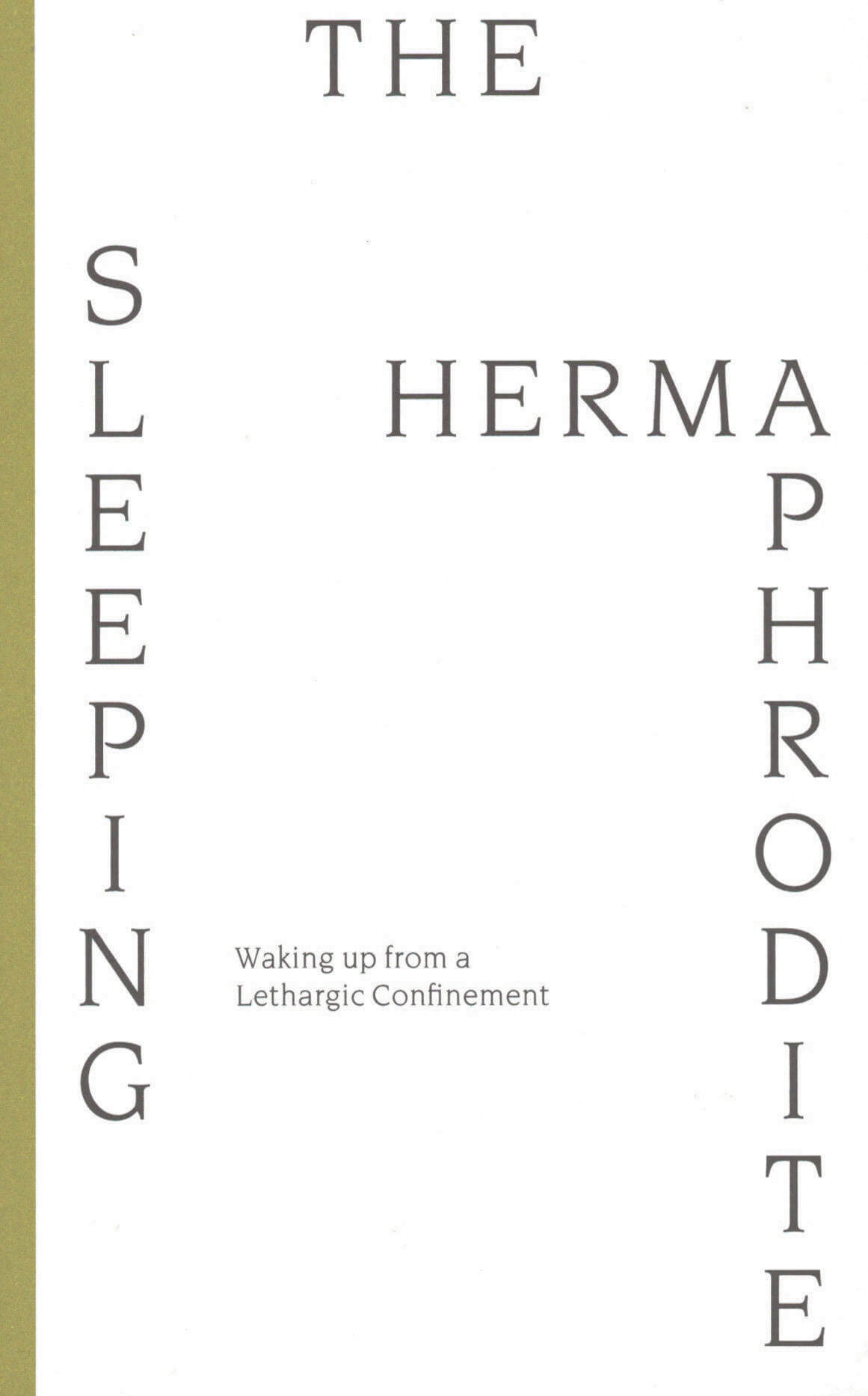Books
Books
in random order

Where does a Body begin? Biology's function in contemporary capitalism
While presented as a contiguous work, the book is formed of different essays that have been dissected, recomposed with artificial connective tissue. The result lies somewhere between the rhizomatic continuity of a Body-without-Organs, and the disjointed assemblage of roadkill; either way, the question of where to even begin remains the same.
These essays each grow out of a particular resentment that developed through years of experience as a working-student of biology, but the task of the book was to transform this into something productive, something that sticks granular propositions into Biology like acupuncture needles. Inherent sexism within Biological research is, after all, not entirely disconnected to Pharmaceutical giants flooding the streets with opiates—and it is simply a writer’s hope that some well positioned words can remind enough people of how its all connected.
In what could be perceived as a philosophical turn, the importance of talking about science, as much as doing it, is re-entering the popular scientific consciousness, and it is high time, too. What was already getting bad under Biden, became catastrophic under Trump, and the infiltration into public research by private institutions and capitalist enterprises, which this book highlights, is proving dire. The capitalisation of all things bio, whether -yoghurt, -metric data or -logical institutions, is necrotic—MeltdownYourBooks didn’t flinch, they just grabbed the scalpel, dowsed the flesh in ethanol, and asked the question we all forget needs answering: where first, Doc?
Meltdown Your Books (M.Y.B.), the pen name, was made as a portmanteau of the seminal essay Meltdown by Nick Land, and the landmark film Throw Away Your Books, Rally in the Streets by Shuji Terayama. I chose the name, almost 3 years ago now, to reflect the political and digital black hole I saw hovering at the edge of contemporary media experience, and to present my work without the muddy veneer of personal identity. It has remained, since its inception, an anonymous project in only the loosest terms. The dedicated could always find my real identity, and some have, and so its anonymous character existed primarily as an element of presentation. Its anonymity existed to emphasize its deindividuated character. The things I discuss and emphasize under the M.Y.B. label are not items with definitive characteristics, they are collective experiences. M.Y.B. is something I cherish beyond self.

Thing
Robert Ford, Trent Adkins and 1 more
Started in 1989 by designer and writer Robert Ford, THING magazine was the voice of the Queer Black music and art scene in the early 1990s. Ford and his editors were part of the burgeoning House music scene, which originated in Chicago’s Queer underground, and some of the top DJs and musicians from that time were featured in the magazine, including Frankie Knuckles, Gemini, Larry Heard, Rupaul, and Deee-Lite. THING published ten issues from 1989-1993, before it was cut short by Ford’s death from AIDS-related illness. All ten issues of THING are collected and published here for the first time.
As House music thrived, THING captured the multidisciplinary nature of the scene, opening its pages to a wide range of subjects: poetry and gossip, fiction and art, interviews and polemics. The HIV/AIDS crisis loomed large in its contents, particularly in the personal reflections and vital treatment resources that it published. An essay by poet Essex Hemphill was published alongside the gossip columnist Michael Musto and Rupaul dished wisdom alongside a diary from the March on Washington for Lesbian, Gay, and Bi Equal Rights and Liberation. Joan Jett Blakk’s revolutionary presidential campaign is contained in these pages, as are some of the most underground, influential literary voices of the time, such as Dennis Cooper, Vaginal Davis, Gary Indiana, Marlon Riggs, David Wojnarowicz, and even David Sedaris.
THING was very much in dialogue with the club kids in New York and other Queer publishing ventures, but in many ways, it fostered an entirely unique perspective—one with more serious ambitions. In a moment when the gay community was besieged by the HIV/AIDS crisis and a wantonly cruel government, the influence and significance of this cheaply-produced newsprint magazine vastly exceeded its humble means, presenting a beautiful portrait of the ball and club culture that existed in Chicago with deep intellectual reflections. THING was a publication by and for its community and understood the fleetingness of its moment. To reencounter this work today, is to reinstate the Black voices who were so central to the history of HIV/AIDS activism and Queer and club culture, but which were often sidelined by white Queer discourse. In many ways, THING offered a blueprint for the fundamental role a magazine plays in bringing together a community, its tagline summing up the bold stakes of this important venture: “She Knows Who She Is.”
The magazine included contributions from Trent D. Adkins, Joey Arias, Aaron Avant Garde, Ed Bailey, Freddie Bain, Basscut, Belasco, Joan Jett Blakk, Simone Bouyer, Lady Bunny, Bunny & Pussy, Derrick Carter, Fire Chick, Chicklet, Stephanie Coleman, Bill Coleman, Lee Collins, Gregory Conerly, Mark Contratto, Dennis Cooper, Dorian Corey, Ed Crosby, The Darva, Vaginal Davis, Deee-Lite, Tor Dettwiler, Riley Evans, Evil, The Fabulous Pop Tarts, Mark Farina, Larry Flick, Robert Ford, Scott Free, David Gandy, Gemini, Gabriel Gomez, Roy Gonsalves, Chuck Gonzales, Tony Greene, André Halmon, Lyle Ashton Harris, Larry Heard, Essex Hemphill, Kathryn Hixson, Sterling Houston, Ishmael Houston-Jones, Gary Indiana, Candy J, Jamoo, Jazzmun, Gant Johnson, Owen Keehnen, Lady Miss Kier, Spencer Kincy, Iris Kit, Erin Krystle, Steve LaFreniere, Larvetta Larvon, Marc Loveless, Lypsinka, Malone, Marjorie Marginal, Terry A. Martin, Rodney McCoy Jr., Alan Miller, Bobby Miller, Michael Musto, Ultra Naté, Willi Ninja, Scott “Spunk” O’Hara, DeAundra Peek, Earl Pleasure, Marlon Riggs, Robert Rodi, Todd Roulette, RuPaul, Chantay Savage, David Sedaris, Rosser Shymanski, Larry Tee, Voice Farm, Lawrence D. Warren, Martha Wash, LeRoy Whitfield, Stephen Winter, David Wojnarowicz, and Hector Xtravaganza.

Revue Phylactere n°2 - Oh là là !
Roxanne Maillet, Auriane Preud'homme
Phylactère est une revue annuelle à voix multiples, née du désir d’explorer l’écriture de l’oralité et les possibilités de retranscription de performance, à travers des visions authentiques, subjectives et spontanées. Donnant la parole à des amateur·ice·s, artiste·s, designer·s et penseur·se·s, la revue Phylactère regroupe des écrits de transition, assumant tous les glissements entre un script, l’action réalisée et sa traduction, avec une attention extrême et aventureuse pour la manière dont les contextes, gestes, émotions et espaces sont mis en jeu lors de cette retranscription.
Initiée par Roxanne Maillet et Auriane Preud’homme à l’invitation de Camille Videcoq lors de la résidence Entrée Principale (Marseille), Phylactère conjugue pratique graphique et éditoriale et démarche curatoriale en intégrant au processus de publication l’organisation de différents événements.
Pour son deuxième numéro, Phylactère prend pour titre l’onomatopée Oh là là !
Avec les contributions de : Anne Lise Le Gac, Benoît Le Boulicaut, Camille Videcoq, Cecil Serres, Claudia Pagès, Considered to be Allies (Margaux Parillaud & Mie Frederikke Fischer Christensen), Ghita Skali, Giuliana Zefferi, Lauren Tortil, Loreto Martínez Troncoso, Louise Hervé & Clovis Maillet, Mona Gérardin-Laverge, Nygel Panasco, pauline l. boulba, Sarah Browne, Susie Green (with Kim Coleman, Simon Bayliss & Rory Pilgrim), Tahnee, L’autre and Tiziana La Melia.
Conception graphique : Auriane Preud'homme et Roxanne Maillet.

Hermaphrodite Logic: A History of Intersex Liberationv
How the intersex liberation movement exposed medical harms and became an inspiration to rethink sex and gender.
Hermaphrodite Logic is a bold examination of intersex liberation. Juliana Gleeson reveals how a movement challenged systemic medical abuses to reshape our understanding of sex. Blending philosophical insights and personal testimonies, Gleeson argues that intersex people have been harmed not just for therapeutic reasons but to ease professional and parental anxieties.

NIGHTNIGHT
In collaboration with Laurent Poleo-Garnier, NIGHTNIGHT is an archive of images and texts from different sources addressing the theme of the night. Over the book as a party that degenerates with fatigue, alcohol and other stimulants, images and layout deteriorate, the subjects get tired, the vision is cloudy...

My Mother Laughs (UK Edition)
In 2013, the filmmaker Chantal Akerman's mother was dying. She flew back from New York to Brussels to care for her, and between dressing her, feeding her and putting her to bed, she wrote. She wrote about her childhood, the escape her mother made from Auschwitz but didn't talk about, the difficulty of loving her girlfriend, C., her fear of what she would do when her mother did die. Among these imperfectly perfect fragments of writing about her life, she placed stills from her films. My Mother Laughs is both the distillation of the themes Akerman pursued throughout her creative life, and a version of the simplest and most complicated love story of all: that between a mother and a daughter.
Translated by Daniella Shreir with an introduction by Eileen Myles and afterword by Frances Morgan.

Questions to Ask Before Your Bat Mitzvah
Questions to Ask Before Your Bat Mitzvah invites 38 writers, artists, scholars, and activists to offer accessible reflections on 36 questions to help young Jews—and anyone else who picks up this book—feel grounded in the Jewish radical tradition, unlearn Zionism, and deepen their solidarity with Palestinians, offering the B’nai Mitzvah as an opportunity for political awakening open to all. Edited by comedic performance artist and activist Morgan Bassichis with artist and educator Jay Saper and writer Rachel Valinsky, with a foreword by seminal scholar-activist Angela Y. Davis, and illustrations by the artist Nicole Eisenman, this essential volume offers an accessible and challenging set of personal and collective responses to critical questions for our time.
Questions included range from “What even is a Bat Mitzvah?” and “I’m queer/nonbinary/secular/old/not even Jewish—are Bat Mitzvahs for me?” to “Why are there Israeli and American flags in my synagogue?” and “Why do people plant trees in Israel as a Bat Mitzvah gift?” and “What does the olive tree symbolize to Palestinians?” and “What does the watermelon symbolize to Palestinians?” and “What do Palestinian kids do when they turn thirteen?” and “How do I talk to my family about this stuff?”

Economy as Intimacy (vol.1)
A series of choreopoems by Eric Peter. Published at the occasion of 'Assemblages of Intimacy' a group exhibition in a Tale of a Tub, Rotterdam in 2018.

Language is a map of failures: Messy thoughts on reading, writing and dressing up
Afternoon Editions no. 3: Language is a map of failures. Messy thoughts on reading, writing and dressing up by Runa Borch Skolseg.
In May 2019, Time has fallen asleep in the afternoon sunshine relocated its base to the Oslo Biennale headquarters in Myntgata, with a room of its own and ongoing activities. Runa Borch Skolseg visited the space at several occasions before its final closure, in 2021. Her invitation to write for the Afternoon Editions bridges the move from one room to another, and is a reflection on how fashion can be a world of fantasy, and drama, a language we all communicate through. With a personal narrative she makes readings of clothes, literature and writing, and how they merge and enrich each other.

Life with Fifi
Kris Dittel, Angelica Falkeling
A children’s book without a specific age category, offering a glimpse into the small rituals and shared moments that shape a day with Fifi Paris.
Fifi, a Pomeranian-Chihuahua mix, came into the lives of Angelica and Kris a few years ago. Taking care of a puppy is taking responsibility for building their world and letting the small animal transform yours. As her human caretakers, the authors created Fifi’s world with toys, cuddles, rules, snacks and walks in the park. In return, she transforms our world by bringing our community together and reminding us of the importance of caring for one another. In this book, Kris and Angelica narrate a day in the life of Fifi, from the moment she wakes up to when she falls asleep at night. Along the way, they share how they connect with her, how they see her understanding her surroundings and what she has taught them about companionship.
Design by Amy Suo Wu
Copy-editing by Clem Edwards
Photography by Lili Huston-Hertreich

The Sleeping Hermaphrodite, Waking up from a Lethargic Confinement
Denis Maksimov, Nicolas Lakiotakis and 2 more
What can a reclining marble sculpture, conceived through a myth in Greek antiquity, tell us today about the fluidity of our gender construction? What has been the role of aesthetic and historical canons in the construction of the female and male genders? Is ‘the sleeping Hermaphrodite’ really asleep? Or has she/he been induced to a long lethargic state, punished and confined by the history of gender normalization?
CONTENTS
My Trans Body is an Empty House
by Paul B. Preciado
Touching the Difference
by Juan Duque
The Sleeping Hermaphroditus
by Juan Duque
Hermaphroditos Anasyromenos
by Nicolas Lakiotakis
Swimming with Myths
by Sofia Grigoriadou
Queer Anticipation:
I Greet You,
Dionysus and Athena
by Denis Maksimov-Gupta
The Transformation of Hermaphrodite
by Juan Duque

Post-Comedy
Not so long ago, comedy and laughter were a shared experience of relief, as Freud famously argued. At their best, ribbing, roasting, piss-taking and insulting were the foundation of a kind of universal culture from which friendship, camaraderie and solidarity could emerge.
Now, comedy is characterized by edgy humour and misplaced jokes that provoke personal and social anxiety, causing divisive cultural warfare in the media and among people. Our comedy is fraught with tension like never before, and so too is our social life. We often hear the claim that no one can take a joke anymore. But what if we really can’t take jokes anymore?
This book argues that the spirit of comedy is the first step in the building of society, but that it has been lost in the era of divisive identity politics. Comedy flares up debates about censorship and cancellation, keeping us divided from one other. This goes against the true universalist spirit of comedy, which is becoming a thing of the past and must be recovered.

If You Don’t Believe in Yourself, Someone Else Should
The publication If You Don’t Believe in Yourself, Someone Else Should is between a monograph and an artist book with a text by Florentine Rungrama Muhry and a conversation between Anna Schachinger and the artist. Together with the graphic designer Alexandra Möllner, they developed a book concept that makes the various strands, the instinctive, methodical and processual working methods as much as the joyful experimental approaches in Katharina Höglinger's work tangible and entertaining.
"The image pulsates with alternating contrasts of light and dark. A sweeping, purple- coloured line unites a human countenance in half profile with the little head of a blue dog. Red strokes in the middle of the canvas, perhaps the arms of an animal-like being, reach into the widened eyes of the one facing it. Expressing its pleasure, the lively creature cheekily sticks its tongue out of its mouth, while the facial expression of the person remains indifferent, in spite of the affront."
(Excerpt from the text "Wandering Thoughts" by Florentine Rungrama Muhry, Translation: Miriam Stoney)

Walking Through Clear Water in a Pool Painted Black, New Edition: Collected Stories
The first collected edition of legendary writer, actress, and adventurer Cookie Mueller's stories, featuring the entire contents of her 1990 book Walking through Clear Water in a Pool Painted Black, alongside more than two dozen others, some previously unpublished.
Legendary as an underground actress, female adventurer, and East Village raconteur, Cookie Mueller's first calling was to the written word: I started writing when I was six and have never stopped completely, she once confessed. Muellerís 1990 Walking through Clear Water in a Pool Painted Black, the first volume of the Semiotext(e) Native Agents series, was the largest collection of stories she compiled during her life. But it presented only a slice of Mueller's prolific work as a writer. This new, landmark volume collects all of Mueller's stories: from the original contents of Clear Water, to additional stories discovered by Amy Scholder for the posthumous anthology Ask Dr. Mueller, to selections from Mueller's art and advice columns for Details and the East Village Eye, to still new stories collected and published here for the first time. Olivia Laing's new introduction situates Mueller's writing within the context of her life—and our times.
Thanks to recent documentaries like Mallory Curley's A Cookie Mueller Encyclopedia and Chloé Griffin's oral biography Edgewise, Mueller's life and work have been discovered by a new generation of readers. Walking through Clear Water in a Pool Painted Black: Collected Stories returns essential source material to these readers, the archive of Mueller's writing itself. Mueller's many mise en scènes—the Baltimore of John Waters, post-Stonewall Provincetown, avant-garde Italy, 1980s New York, an America enduring Reagan and AIDS—patches together a singular personal history and a primer for others. As Laing writes in her introduction, Collected Stories amounts to a how-to manual for a life ricocheting joyously off the rails, a live corrective to conformity, conservatism, and cruelty.

A Map of Absence: An Anthology of Palestinian Writing on the Nakba
A Map of Absence presents the finest poetry and prose by Palestinian writers over the last seventy years. Featuring writers in the diaspora and those living under occupation, these striking entries pay testament to one of the most pivotal events in modern history – the 1948 Nakba.
This unique, landmark anthology includes translated excerpts of works by major authors such as Mahmoud Darwish, Ghassan Kanafani and Fadwa Tuqan alongside those of emerging writers, published here in English for the first time. Depicting the varied aspects of Palestinian life both before and after 1948, their writings highlight the ongoing resonances of the Nakba.
An intimate companion for all lovers of world literature, A Map of Absence reveals the depth and breadth of Palestinian writing.

Gravity And Grace
Simone Weil, the French philosopher, political activist, and religious mystic, was little known when she died young in 1943. Four years later the philosopher-farmer Gustave Thibon compiled La pesanteur et la grbce from the notebooks she left in his keeping.
In 1952 this English translation accelerated the fame and influence of Simone Weil. The striking aphorisms in Gravity and Grace reflect the religious philosophy of Weil's last years. Written at the onset of World War II, when her health was deteriorating and her left-wing social activism was giving way to spiritual introspection, this masterwork makes clear why critics have called Simone Weil "a great soul who might have become a saint" and "the Outsider as saint, in an age of alienation." Introducer Thomas R. Nevin is a professor of classical studies at John Carroll University and the author of Simone Weil: Portrait of a Self-Exiled Jew.

Pleasure Beach
Pleasure Beach is a queer love story from the North West’s saucy seaside paradise, Blackpool, on one day: 16 June 1999. Written in multiple voices and styles, Pleasure Beach follows the interconnecting journeys and thoughts of three young women over the course of 24 hours and over 18 chapters which are structured and themed in the same way as James Joyce’s Ulysses.
Hedonist and wannabe playwright Olga Adessi, 19, is struggling along the prom to get to her morning shift at the chippy with a monstrous hangover, trying to remember exactly what happened with Rachel Watkins, 19, a strange and fragile girl she had an encounter with the night before. Former gymnast and teenage mum Treesa Reynolds, 19, is off to the Sandcastle Waterpark with her mum Lou and daughter Lulu, looking forward to a sausage and egg McMuffin on the way.
Pleasure Beach breathes and exhales the unique sea air, fish and chips, donuts and candyfloss scents of Blackpool, bringing to life everything the town is famous for, portraying the gritty magic and sheer unadulterated fun of the city and its people across a spectrum of sensory experiences and emotions.

Un Rectangle Quelconque n°5
Tomas Sidoli, Emmanuel Régniez and 1 more
Avec les poèmes et traductions de: Warsan Shire, Sika Fakambi, Anne-Claire Hello, Aurore Dal Mas, Connie Scozzaro, Chloe Chignell, Camille Fresnois, Simon Asencio, Marie De Quatrebarbes.
Aves les images de Aurore Dal Mas.
Édition: Thomas Le Goff, Emmanuel Régniez, Tomas Sidoli.
Les éditions du quelconque se divisent en deux projets, une maison d'édition (à venir) et une revue, Un Rectangle Quelconque. Cette dernière, chaque semestre, propose de découvrir des auteurs de poésie venant de tous horizons géographiques et esthétiques. La maison d'édition, elle, sera l'occasion de présenter aux lecteurs francophones des nouvelles voix de la poésie actuelle.

A take away cup and a cloud
A take away cup and a cloud is an essay written alongside the dance performance Seems to be by Denise Lim and Stina Ehn. It plays with a variety of containers–the list form being one. By mixing a personal with a historical gaze it traces the trajectory of mundane commodities and the replacement of material with imaterial objects brought about to the everyday by technical progress.

MW Collected Texts (Bootleg)
This bootleg edition collects scanned copies of Monique Wittig's writing. It includes; The Lesbian Body, Les Guérillères, The Opoponax, and Lesbian Peoples: material for a dictionary— In true bootleg style, punk enough to carry the truly radical words of Wittig: scans, a little grainy, with marginalia of unknown origins. Now, we can dress ourselves in the ravishingly erotic, violent splendorous brilliance to become baby Wittigs.
This edition was assembled out of a deep love of Wittig's work by Chloe Chignell.
Monique Wittig was a French author and feminist theorist particularly interested in overcoming gender and the heterosexual contract. She published her first novel, L'opoponax, in 1964. Her second novel, Les Guérillères (1969), was a landmark in lesbian feminism.

Reality (Dark) Fragments (Light)
This monograph covers more than fifty years of creation by Art & Language, whose artists are at the origin of conceptual art. Through unpublished texts by Matthew Jesse Jackson and Art & Language, a transcript of their opera libretto Victorine, and an interview with the artist collective, this publication questions their journey, and more broadly, the relationship between contemporary art and conceptual art.
The permanent collection of the Château de Montsoreau – Museum of Contemporary Art has grown to include 800 works from Art & Language. To celebrate this event, the museum produced a major exhibition and a publication titled Reality (Dark) Fragments (Light). The monograph and exhibition look back at 50 years of creation by these critical, provocative, subversive, punk art collective. They question the main issues involved in Art & Language's work: conversation as an artwork, description, transdiciplinarity, crisis in the relationship between the artist, the museum and the art gallery.
Edited by Marie-Caroline Chaudruc.
Foreword by Marie-Caroline Chaudruc.
Text by Matthew Jesse Jackson, interview with Art & Language by Victorine Meurent.

24 European Ethnographic Museums
With the series '24 European Ethnographic Museums' Van der Heide questions the construction and identity of the ethnographic museum today. Here, the project becomes a collection of artefacts in and upon itself and by recording the names of these institutions Van der Heide places the viewer in front of the dilemma: who is authorized to decide what is an artefact, and what should be collected and for what reason? In the 19th century, with the birth of the current European nations, museums openly referred to their colonial past. Today the museums bare more euphemistic names like: ‘Museum der Kulturen’ or ‘World Museum’ but still place the West as the self-acclaimed center of the world. The existence of the ethnographic museum, which is intertwined with the complicated and loaded colonial past, has been subject to contemporary criticism. While some of the European ethnographic institutions have attempted to come to terms with the past of their collections and their heritage, Van der Heide focuses upon how language continues to reflect the political present of the institutions.

Fort Beau
Fort Beau – verhalen van beginnen en eindes, een nieuw boek van kunstcriticus en curator Pieter Van Bogaert ontstaan aan zee, is het eerste in de Bibliotheek van de Noordzee: een nieuwe reeks van Kunstencentrum KAAP over kunst en samenleving.
Fort Beau heeft twee beginnen en eindes: één van elk op de linkerpagina’s en nog eens hetzelfde maar anders – als een vage kopie – rechts. Van de kunst van het lopen gaat het naar lopen als kunst. Van het strand in Oostende gaat het naar het Kaaitheater in Brussel. Van de huiskamer naar de wereld. Van de Palestijnen naar de sans-papiers. Twee boeken naast elkaar die zich in een gedurfde vormgeving van Maaike Beuten ontwikkelen en besmetten tot één verhaal.

Studies on Squats
Studies on Squats is an evocative exploration of embodied resistance and political movement that uses the multifaceted posture of the “Asian Squat” as a lens through which broader concepts of migration, illness, and resilience are examined. In Studies on Squats, the body—in its most vulnerable and potent states—becomes a speculative site for reclaiming agency by crafting new forms of protest that draw from ancestral strength, humor and eroticism. This posture, rich with cultural resonance, offers as an entry point to imagine ways in which the body can engage in acts of defiance against systems of oppression. Studies on Squats invites the audience to consider how dance and choreographic thinking can serve as tools for envisioning alternative futures, where artistry empowers those enduring systemic social injustices to transform their realities.